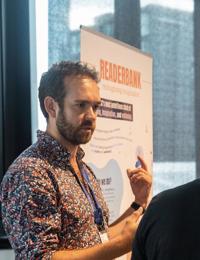Imagination cards related to the study. (Georgia Punton via SWNS)
By Talker
By Stephen Beech
Understanding book readers’ imaginations could lead to better mental health therapies, according to research.
A new tool to understand how people imagine differently when reading has potential implications for treating mental health issues, say scientists.
The ReaderBank Imagination Quiz has been developed by a team led by Durham University researchers.
It has identified four “forces” of imagination – space and vision, voice and language, people models, and perspective.
Researchers say those forces have “strong and specific” connections to mental imagery, immersion in a story, daydreaming, and intrusive thoughts.
The quiz reveals the “complexity” of people’s reading minds and what the researchers describe as a “radical diversity” of imagination skills.
The research team believes understanding how different people respond to reading could provide a greater insight into how their imaginations work.
And that could eventually allow for mental health therapies to be better adapted to the individual.
Members of the ReaderBank team at the Edinburgh International Book Festival. (Georgia Punton via SWNS)
By Talker
Lead author Professor Ben Alderson-Day, of Durham University, said: “The diversity of imagination is about multiple senses, how we engage with and understand others and how we’re not always aware when we’re building imaginative worlds whilst reading.
“This is relevant when we start thinking about mental health, because there are lots of aspects of mental health which are all about thoughts, memories, and ideas coming to us, that we can’t control.
“Lots of psychotherapy methods rely on the imagination, but we never screen people for what kind of imagination they have.
“This tool, which is nominally about reading, is about offering a window on that diversity of imagination.
“Our end goal is thinking how can we use these sorts of tools to inform more precise, more detailed pictures of how psychotherapy is going to work?”
The ReaderBank Imagination Quiz stems from ReaderBank – an attempt to use reading and book festivals to study the imagination and mental health in new ways.
(Photo by Filipe Sabino via Pexels)
The project is a collaboration between Durham University and the Edinburgh International Book Festival.
Researchers quizzed 867 people on their reading experiences across two Edinburgh International Book Festivals in 2023 and 2024. A third group took part online.
Participants were 18 or over, had read a fiction book in the last six months, and were fluent in English.
They completed questionnaires about reading habits, including how much and how frequently they read books, preferred types of books or e-books, and most read genres.
Other questions were aimed at how people visualised what they were reading – such as faces and scenes – and how they experienced inner speech or physical and sensory feelings.
The survey also looked at how conscious readers were of what they were reading and the impact it had on them.
Ben Alderson-Day, lead ReaderBank researcher. (Georgia Punton via SWNS)
By Talker
The research team found a “radical diversity of imagination skills”.
They say that understanding the range of imagination could be used to refine treatments for similar traits in mental illness.
The ReaderBank findings are due to be presented today (Aug. 13) at the Edinburgh International Book Festival.
And ReaderBank will be continuing at the event with a new series of studies.
Dr. Wajid Khan, head of research at Southwest Yorkshire Partnership NHS Foundation Trust, said: “These research findings shine new light on the role the imagination and creativity can play in helping build, maintain and change cognitive schemas and wider psychological processes.
(Photo by Andrea Piacquadio via Pexels)
By Talker
“ReaderBank has far-reaching implications for the way we manage recovery and resilience in clinical mental health services.”
The research team included experts from Durham University’s Department of English Studies and the National Poetry Centre in Leeds.
Jenny Niven, Director of the Edinburgh International Book Festival, added: “We are delighted to be a partner in Durham University’s ReaderBank project.
“The Book Festival is a site for collaboration, innovation and creativity, and working with the ReaderBank team and our audiences over the last couple of years has given us a fascinating insight into our diverse audience of curious readers, and the different ways we engage with fiction.”





